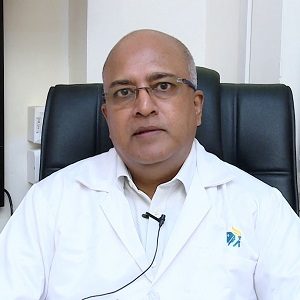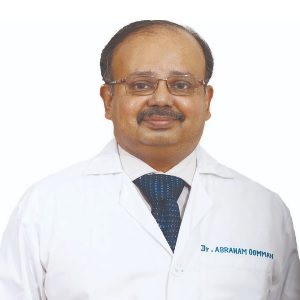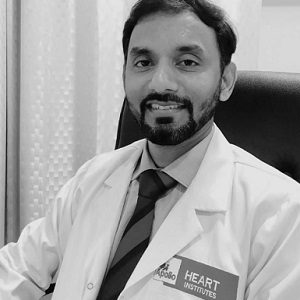Best Doctors in India for Alcoholic Hepatitis Treatment
- Hepatologist and Transplant Physician, Chennai, India
- Over 30 years’ experience
Profile Highlights:
- Dr. Murugan N is one of the best Hepatologists in Chennai and has a total of 30 years of experience in the field.
- Owing training in hepatology at various Hospitals abroad, he treated chronic patients with liver cirrhosis and chronic hepatitis. He has spent years performing endoscopic procedures for the same.
- He is a member of the Liver Transplant Program team that performs around 60 transplants every year. To date, he has performed 15 successful liver transplants.
- Gastroenterologist and GI Medicine Specialist, Chennai, India
- Over 18 years’ experience
Profile Highlights:
- Dr. Preethi M is one of the best gastroenterologists in India, with 18 years of expertise.
- Dr. Preethi received many awards for her contribution to the field.
- She offers consultation for Irritable Bowel Syndrome (IBS), Hemorrhoids, Endoscopy, female problems, and other gastrointestinal issues.
- Gastroenterologist and GI Medicine Specialist, Chennai, India
- Over 23 years’ experience
Profile Highlights:
- Dr. Ubal Dhus is a GI specialist doctor in South India who is proficiently managing Gastroenterological disorders for the past 23 years.
- He acquired his medical degree from Madras University, Chennai, and served people with Hemorrhoids Treatment, and Irritable Bowel Syndrome (IBS) Treatment.
- Cardiologist, Chennai, India
- Over 31 years’ experience
Profile Highlights:
- Dr. Abraham Oomman is one of the best Cardiologists in Chennai, having an experience of 31 years in this field.
- Dr. Oomman offers consultation and also performs cardiac procedures. He specializes in Preventive Cardiology, Interventional Cardiology, Rheumatic Heart Disease, and Lipidology.
- Patients also visit him for ASD and VSD Surgery, Dextro-Transposition of the Great Arteries (DTGA), Minimally Invasive Cardiac Surgery, and Vascular Surgery.
- General Surgeon, Chennai, India
- Over 31 years’ experience
Profile Highlights:
- Dr. Pandiaraj R A is one of the best general surgeons in Tamil Nadu, having more than three decades of experience.
- The doctor performs surgeries required for Tonsillitis Treatment, keloid or scar treatment, Sclerotherapy, Laparoscopy, Surgical Gastroenterology, Trauma Surgery & Thyroid Surgery, etc.
- Dr. Pandiaraj published articles in many International & National journals.
- Cardiologist, Chennai, India
- Over 22 years’ experience
Profile Highlights:
- Dr. Refai is a world-renowned cardiologist who practices at Apollo Hospital in Greams Road, Chennai.
- Dr. Refai completed advanced training in the United Kingdom after finishing his medical degrees in India.
- He specializes in Angioplasty (Stent implantation), Implantable Cardioverter-Defibrillators (ICDS), Transradial Rotablation, Chronic Total Occlusion Angiography, Pacemaker, Cardiac Invasive Procedures, Bypass Surgery, and other cardiovascular procedures.
- He was involved in many TAVI-related studies at King’s College Hospital in London, and a heart failure pilot trial at The Essex.
- Interventional Cardiologist, Chennai, India
- Over 38 years’ experience
Profile Highlights:
- Dr. I Sathyamurthy is a veteran Cardiologist and has an experience of more than 38 years in Interventional Cardiology.
- Dr. Immaneni Sathyamurthy is a distinguished personality who bagged Padma Shri, the fourth-highest Indian civilian award. In addition to it, he was conferred many awards for his contribution to the medical sciences.
- He has over 250 publications to his credit, some of these are used as textbooks in medical courses.
- Interventional Cardiologist, Chennai, India
- Over 25 years’ experience
Profile Highlights:
- Dr. Karthigesan A M is a renowned Interventional Cardiologist with more than two decades of experience.
- He completed advanced training in cardiac arrhythmia in the USA to serve his patients in a better way.
- Dr. A M Karthigesan received several awards from prestigious associations for his contribution to the field.
- Dr. Karthigesan authored several research papers and articles in premier periodicals and presented papers at national conferences.
- Interventional Cardiologist, Chennai, India
- Over 32 years’ experience
Profile Highlights:
- Dr. Asha Mahilmaran is a seasoned Interventional Cardiologist in Chennai, with more than three decades of expertise in the sector.
- She excelled in academics and was awarded a gold medal in medicine and cardiology.
- Dr. Mahilmaran offers Ventricular Septal Defect Surgery, Cardioversion, Carotid Artery Disease, Chest Pain Treatment, Cardiac Ablation, and Dextro-Transposition of the Great Arteries (DTGA), etc.
- Over the years, she has performed over 15,000 preventive heart checkups.
- Interventional Cardiologist, Chennai, India
- Over 25 years’ experience
Profile Highlights:
- Dr. Prakash Chand Jain is a renowned name among cardiology experts.
- Dr. Jain specializes in Transesophageal Echocardiogram, Atrial Fibrillation, Permanent Pacemaker, and Angioplasty.
- With his 25+ years of experience, he benefitted patients from counseling, diagnosis, and treatment. Some services he offers include TMT, Ambulatory BP Monitoring, MPI Test, PET scan, Valve Repair Replacement, ASD closure, etc.
Best Hospitals in India for Alcoholic Hepatitis Treatment
ALCOHOLIC HEPATITIS
Alcoholic hepatitis is a liver infection, which is mainly caused by frequent, heavy use of alcohol. Fat can build up in the liver cells, which might lead to inflammation as well as scarring of the liver.
Alcoholic hepatitis might be mild or severe. A patient might even need a liver transplant if proper treatment is not provided, or if they don’t stop consumption of alcohol.
It is also notable that all heavy drinkers don’t develop this condition, and sometimes this condition even develops in people who drink moderately. However, if you are diagnosed with this condition, it is important for you to quit drinking alcohol. People who continue drinking alcohol might face a huge risk of serious liver damage as well as death.
Symptoms
Depending on the amount of damage to the liver, the symptoms can vary. If you are having a mild form of the disease, you might not even experience any symptoms at all. However, as the damage continues to grow, you might experience the following:
- Changes in appetite
- Dry mouth
- Weight loss
- Pain or swelling in the abdomen
- Jaundice, or yellowing of the skin or eyes
- Fever
- Nausea and vomiting
- Easy bleeding or bruising
- Changes in your mental state, including confusion
- Fatigue
The symptoms of this condition are similar to those caused by a few other health conditions. Therefore, if you develop any of these symptoms, it is best to get a proper diagnosis as well as begin treatment.
Causes & risk factors
Alcoholic hepatitis generally develops when the alcohol you drink causes damage to your liver. However, it is not clear why alcohol does this damages only to some heavy drinkers.
Few factors that are known to play a role in this condition include:
- The body’s process that breaks down alcohol produces some toxic chemicals
- These chemicals can trigger inflammation that can destroy the liver cells
- Thus, over time, scars replace healthy liver tissue, thus interfering with the function of the liver
- This irreversible scarring, which is also termed cirrhosis, is the final stage of alcoholic liver disease
If you have hepatitis C and continue to drink, even moderately, you are more likely to develop cirrhosis.
Some heavy drinkers are also malnourished because they don’t eat a proper balanced diet. Alcohol and its byproducts also prevent the body from absorbing nutrition properly. Lack of nutrition can contribute to liver cell damage.
Some other risk factors that can lead to this condition include:
- Your sex- Women are usually at a higher risk of developing alcoholic hepatitis since the way alcohol is processed in women is different.
- Binge drinking- Having over five drinks within two hours for men and four or more for women can increase the risk of alcoholic hepatitis.
- Obesity- Heavy drinkers who are overweight are also more likely to develop alcoholic hepatitis and to progress from that condition to cirrhosis.
- Race and ethnicity- Hispanic and Negroid people might be at higher risk of alcoholic hepatitis.
- Genetic factors- According to studies, there may be a genetic component in alcohol-induced liver disease. However, it is difficult to separate genetic and environmental factors.
Diagnosis
If you are showing symptoms of alcoholic hepatitis, your doctor will first inquire about your medical history and alcohol consumption. Next, he/she will perform a physical exam to see if you have an enlarged liver or spleen. They might also need a few more tests to confirm your diagnosis, such as:
- Complete blood count (CBC)
- Liver function test
- Ultrasound of the liver
- Abdominal CT scan
- Blood clotting tests
In some cases, a liver biopsy might also be needed to confirm the diagnosis of alcoholic hepatitis. A liver biopsy requires your doctor to remove a tissue sample from your liver, which is then tested in the lab. This method helps to show the severity and type of liver disease.
Treatment
Stopping alcohol consumption is the most important treatment for alcoholic hepatitis. There is no cure for this condition, but treatment can help in reducing or eliminating symptoms, or stopping its progression.
It is also important to note that scarring of the liver is permanent, but treatment can aim to restore as much function as possible.
Dietary changes
Medication
Liver transplant
The best hope of recovery is to be aware of the signs and symptoms as well as to reduce, manage, or if possible, completely stop consumption of alcohol.
Complications
Alcoholic hepatitis might lead to severe other complications such as:
- Enlarged veins (varices)- In this condition, blood that is unable to flow freely through the portal vein, can back up into other blood vessels in your esophagus or stomach.
- Hepatic encephalopathy- This condition can be caused by the buildup of toxins if your damaged liver is unable to remove all the toxins from your body. It involves confusion, drowsiness, and slurred speech.
- Ascites- Ascites is a condition in which the fluid that accumulates in the abdomen may get infected and thus, require treatment with antibiotics. Although this condition is not life-threatening, it can be a sign of advanced alcoholic hepatitis, or cirrhosis.
- Kidney failure- A damaged liver affects blood flow to the kidneys, thus resulting in kidney failure.
- Cirrhosis- The scarring of the liver might lead to liver failure.
Prevention
Alcoholic hepatitis might be prevented if you take the following steps:
- Drink alcohol in moderation, if at all- For healthy adults, moderate drinking means no more than one drink a day for women of all ages and men older than 65, and not over two drinks a day for men aged 65 and younger. However, if you prevent all alcohol, it is a certain way to prevent this condition.
- Check before mixing medications and alcohol- Ask your doctor if it’s safe to drink alcohol while you are taking medications. Consider reading the warning labels on over-the-counter medications as well. Don’t drink alcohol when you are taking medications that warn of complications when combined with alcohol.
- Protect yourself from hepatitis C- Hepatitis C is an infectious liver disease that is caused by a virus. If it is left untreated, it may lead to cirrhosis. If you are having hepatitis C and you consume alcohol, you’re generally more likely to develop cirrhosis than if you don’t drink.















